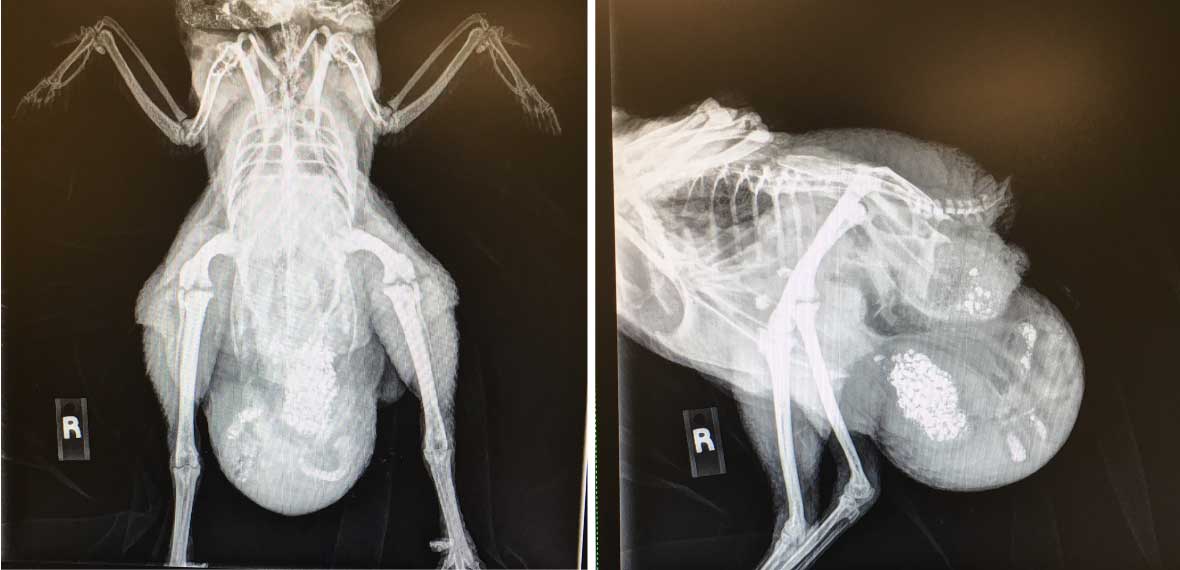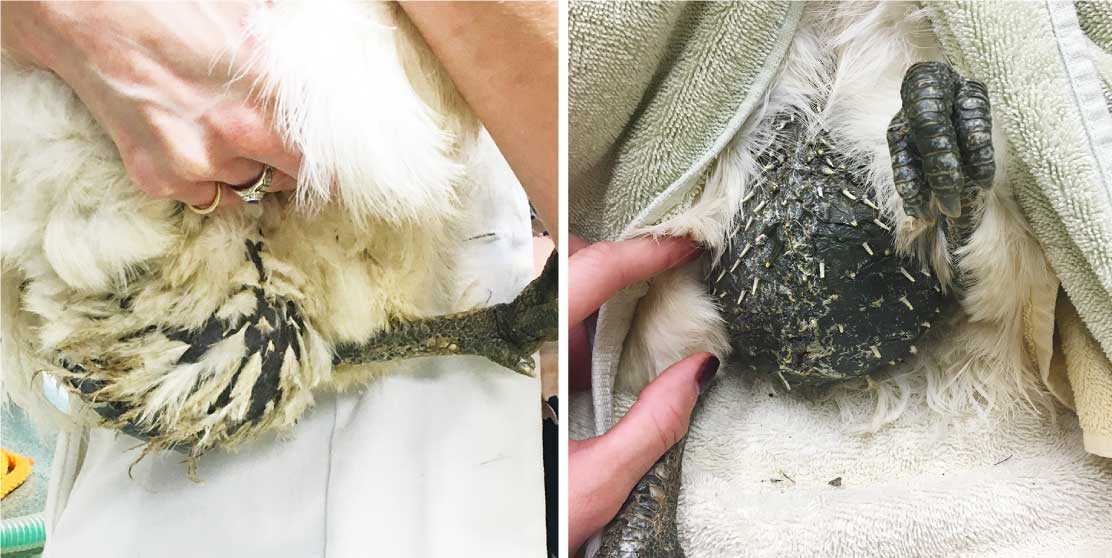Jay Jay is a young Silkie chicken who was brought to us when her owners noticed that her coelom (belly) appeared distended. Jay Jay was acting normally otherwise, but her owners were very astute getting her into the clinic, as birds are very good at hiding illness, and a big belly in a bird should always be investigated. A distended coelom (big belly) in birds can be caused by different things:
- fluid (including egg yolk peritonitis)
- an egg
- an organ enlargement (including cancerous tumors)
Therefore, x-rays were the most helpful diagnostic when Jay Jay presented to us. We were a little surprised by the x-rays, as we actually didn't find any of these things; instead, it looked as though Jay Jay had a large hernia! This is not a very common finding in chickens. On x-rays it is quite easy to see just how large Jay Jay's coelom was distended, but you can also see that all of her internal organs were contained in that space as well. The bright white objects on the x-rays are most likely oyster shell fragments that the owners feed the flock for calcium supplementation and are helpful for visualizing the GI tract in this case!

Jay Jay's radiographs showing her distended abdomen
An Unexpected Discovery
Jay Jay underwent surgery to repair the hernia, as her belly was dragging on the ground when she walked; usually large hernias like this one do not pose a huge problem in terms of organ entrapment, but we still want to fix it. In surgery, we actually found that Jay Jay did not have a true hernia, but instead just had very thin, stretched coelomic musculature, causing the skin to stretch as well. Our best hypothesis is that this is due to egg production; chickens lay a lot of eggs, which can take a toll on the body due to the hormones and high energy requirements, and in Jay Jay's case, likely causing her coelomic muscles to stretch and weaken. Therefore, in addition to tightening up the coelomic wall during closure, we also spayed Jay Jay by removing her oviduct (birds generally only have one oviduct, the left one!).
We also placed an implant to shut down Jay Jay's reproductive hormones to speed up the process. This means that Jay Jay will no longer be able to lay eggs, but luckily her owners love her just as she is.

Left photo shows Jay Jay's belly before surgery. Right photo shows Jay Jay's belly at her suture removal appointment after the repair
Jay Jay recovered from surgery beautifully. While there was not a hernia to repair, we were still able to close up the coelom tightly enough that Jay Jay's belly no longer looks distended and is no longer dragging on the ground. This Silkie chicken is back to her spunky self, and we feel lucky to have gotten to work on such an interesting case!!
Written by Dr. Becca Gounaris of Pleasantville Animal Hospital of Fallston
Pleasantville Animal Hospital of Fallston, located in Fallston, Maryland, is a family-owned, full-service hospital that provides veterinary services for dogs, cats and birds. Their expertise in the field now spans over three family generations, and they are very proud of this unique heritage. The hospital has an in-house laboratory, allowing for rapid diagnostic testing for critical care patients, digital radiography (xrays), surgical suite, and an on-site pharmacy. Dr. Scott Gounaris has been practicing veterinary medicine for 35 years and founded Pleasantville Animal Hospital in 2002. His daughter, Dr. Rebecca Gounaris, now works alongside him, and they approach each case as a team.
Follow them on social media:
About Dr. Rebecca Gounaris
Dr. Rebecca L. Gounaris is a small animal and backyard poultry veterinarian at Pleasantville Animal Hospital of Fallston in Fallston, MD. She is a 2016 graduate of the Virginia-Maryland College of Veterinary Medicine. In addition to her lifetime love for cats and dogs, she has a deep passion for birds and participated in externships at several exotic veterinary clinics during her senior year. She worked for many years at Tri-State Bird Rescue & Research in Newark, DE, where she formed the foundation of her career caring for birds in need. Dr. Rebecca acquired her first flock of chickens in 2019 and has completely fallen in love with backyard poultry. She now has close to 30 chickens (yes, they all have names) that live on her wooded property in PA, where she lives with her husband, Brandon, and baby boy, Ezra. One of her greatest ambitions is normalizing medical care for backyard poultry.
About Dr. Scott Gounaris
Dr. Scott Gounaris graduated from the University of Florida Veterinary School in 1982. His lifetime love for animals drove him to choose veterinary medicine as he wanted to help animals that could not help themselves. Dr. Scott Gounaris enjoys the teamwork that we and the pet owners employ to work together for the welfare of their pets. The greatest reward for him is a positive outcome for his patient and their owners. With over 40 years of experience in the veterinary field, Dr. Scott Gounaris has seen it all. Prior to opening Pleasantville Animal Hospital of Fallston, he worked for his father, who was also a veterinarian. Now the father of a recent veterinary school graduate, a current veterinary school student, and a college undergraduate, he has shared his love of the profession with the next generation of Gounaris doctors.

